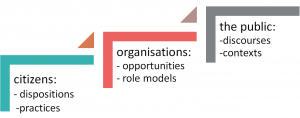European solidarity is a multifaceted and multidimensional phenomenon. Its analysis requires a research design that mirrors this complexity at the theoretical and empirical levels.
First, TransSOL put its focus on attitudes and behaviours, following previous findings stating that the disposition to help does not necessarily translate into actions. Going beyond the study of attitudes, we also targeted more palpable forms of solidarity, such as individual practices and acts of help and support.
Second, TransSOL placed attention on both the charitable and the political dimensions of solidarity. On the one hand, the project shed light on solidarity in terms of dispositions or acts of (financial) help to the needy. On the other hand, we were interested in the political practices of solidarity and the collective actions through which people strive to improve the situations of others in need by mobilising public support, committing stakeholders and/or changing public policies on their behalf (e.g., public claims-making, political protests, communication campaigns).
 Third, our project analysed transnational solidarity at different levels of observation. We captured the level of individual citizens and interpersonal relationships and study the effects of socio-demographic factors (such as gender, age, social class etc.) on individual solidarity. Moreover, we targeted the level of civil society and social movement organisations, aiming to understand how civil society actors mobilise and organise European solidarity in specific fields of action. And finally, we analysed the level of general public spheres and discourses in order to elucidate how solidarity is communicatively generated, reproduced or destroyed as an idea, norm and practice.
Third, our project analysed transnational solidarity at different levels of observation. We captured the level of individual citizens and interpersonal relationships and study the effects of socio-demographic factors (such as gender, age, social class etc.) on individual solidarity. Moreover, we targeted the level of civil society and social movement organisations, aiming to understand how civil society actors mobilise and organise European solidarity in specific fields of action. And finally, we analysed the level of general public spheres and discourses in order to elucidate how solidarity is communicatively generated, reproduced or destroyed as an idea, norm and practice.
Our research aim was to measure and analyse the interrelations between these various dimensions of analysis by means of a research methodology that combined various data sets:
- a compound data set of indicators of the legal, political and socio-economic traits of each country under study;
- a mapping of transnational solidarity initiatives in each of the eight countries;
- an individual survey amongst European citizens in the member states under analysis;
- an organisational study amongst associations in the field of transnational solidarity;
- interviews with experts, activists and organisational representatives; and
- content analyses of national mainstream mass-media and online media.
Moreover, our research approach accounted for the fact that European solidarity is a complex phenomenon conditioned by specific circumstances. TransSOL took a comparative perspective, examining the situation in different countries and with regard to distinct issue fields and target groups.
On the one hand, TransSOL differentiated between eight different European countries and measured cross-country solidarity in Denmark, France, Germany, Greece, Italy, Poland, Switzerland and the UK. This implied that each task of the project was conducted in parallel across all eight countries, allowing for systematic cross-country comparison.
On the other hand, TransSOL aimed to explore whether and how solidarity attitudes and practices vary between different target groups and areas. We devoted ourselves in particular to the unemployed, immigrants and refugees, and people with disabilities. This comparative approach was the foundation to better understand how and why solidarity varies across target groups at times of crisis.

